Mosquito Control Program

For more than 35 years, the City of St. Charles has partnered with Clarke for its mosquito control program. The program monitors mosquito activity and manages the spread of West Nile Virus and other diseases through targeted methods, and includes community-wide spraying when necessary.
Why does the City spray for mosquitoes?
Spraying typically occurs when mosquitoes carrying the West Nile Virus have been detected in the area. This helps reduce the population of mosquitoes that can transmit the virus to humans. Learn more about the West Nile Virus from the Illinois Department of Public Health.
Is the spray safe for humans and pets?
Clarke assures the treatments pose no risk to humans and pets. People and pets can be outside during spraying. The mist dissipates quickly—typically within 5 to 30 minutes—depending on weather conditions.
Is the spray harmful to bees and other beneficial insects?
Clarke sprays at dusk/dark when insects, such as bees and butterflies, are not active. The timing of the spray and the application method, small droplets in the air at a very low rate, (typically less than 3 ounces per acre) should not affect beneficial insects.
Is the spray safe for aquatic life?
Clarke applies a the product in small droplets in the air from a truck driven on roads, which should not affect aquatic life.
Is the spray safe for the environment?
The mosquito control products used by Clarke are registered with the U.S. Environmental Protection Agency (EPA). These products and their ingredients are required to undergo rigorous testing to ensure they pose no significant risk to humans, animals, or the environment when used properly. The spray is applied at a very low rate and breaks down quickly. It is approved for ground and aerial applications in outdoor, residential, and recreational areas. Learn more information from the EPA.
When does the City spray for mosquitoes?
Spraying is done at dusk or after dark, when mosquitoes are most active and beneficial insects like bees and butterflies are not. It is an ultra-low-volume spray applied into the air only, targeting active adult mosquitoes.
Are other methods of mosquito control used?
Multiple methods are used to prevent and control mosquitoes that spread viruses. Spraying targets adult mosquitoes, but Clarke also uses larvicide treatments to control mosquito larvae in standing water areas like drainage basins. This proactive approach helps reduce mosquito populations before they mature.
How is the spray applied?
The adult mosquito control spray is only applied as small droplets in the air from a truck driven on roads.
How is it determined that mosquitoes are carrying West Nile Virus?
Clarke places traps throughout the area and tests collected mosquitoes for West Nile Virus and other mosquito-borne diseases. In the interest of public health, St. Charles often coordinates with neighboring communities to conduct spraying after West Nile-positive mosquitoes are confirmed in the tri-cities area.
Are there other reasons the City might spray besides West Nile Virus detection?
The City uses the positive detection of mosquito-borne disease as well as high mosquito nuisance and infestation levels as criteria to perform adult mosquito control treatments.
Product Information
More about the specific treatment used is on Clarke's website here.
Mosquito Hotline
For questions about Clarke’s mosquito control products or methods, call the Mosquito Hotline: 1.800.942.2555.
Get Notified of an Upcoming Application
Visit the Clarke Customer Portal at clarkeportal.com to sign up for notifications of an upcoming spray, or to report standing water and high mosquito annoyance in the area.
More Tips to Prevent Bites
- Eliminate standing water in bird baths, ponds, pet bowls, wading pools, clogged gutters, hollow stumps, pool covers and other places in which mosquitoes might breed (it only takes 10 days).
- Avoid being outdoors at dawn, dusk and early evening when mosquitoes are most active. If outdoors at these times, loose-fitting, light colored clothing is best. Wear shoes and socks, long pants, and a long-sleeved shirt.
- Apply mosquito repellent containing 25% to 35% DEET sparingly to exposed skin or clothing. Use a weaker solution on young children and do not spray directly on them – spray your hand and wipe it on exposed skin.
- Check and repair holes or tears in window and door screens, including porches and patios.
- Remember to protect pets that spend time outdoors. No vaccine is currently available for domestic animals. Although there is no evidence of human infection from animals, it is best to avoid barehanded contact with sick animals.
- Dead birds should be handled with gloves, sealed in plastic bags and disposed of with regular trash. It is not necessary to report the dead bird to the Health Department or Animal Control.
- Keep informed. We will do our best to pass along new developments, but also watch for updates in newspapers and on the web.